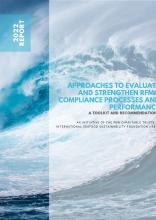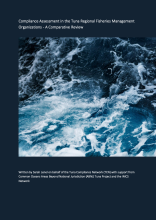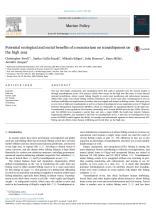Approaches to Evaluate and Strengthen RFMO Compliance Processes and Performance – a Toolkit and Recommendations
This document was developed by an Expert Review Group based on outcomes from three Virtual
Expert Workshops on Best Practices in Compliance in RFMOs, convened by The Pew Charitable Trusts,
in collaboration with the International Seafood Sustainability Foundation (ISSF), with the support of a
Steering Committee. The document examines the compliance processes of the RFMOs and makes several recommendations for their strengthening.
Expert Workshops on Best Practices in Compliance in RFMOs, convened by The Pew Charitable Trusts,
in collaboration with the International Seafood Sustainability Foundation (ISSF), with the support of a
Steering Committee. The document examines the compliance processes of the RFMOs and makes several recommendations for their strengthening.


